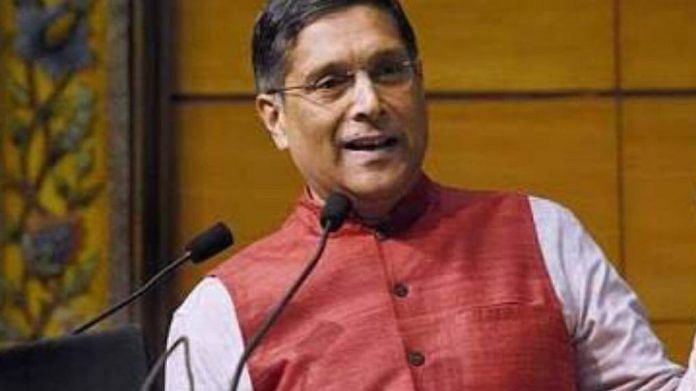In his upcoming book, former chief economic adviser Arvind Subramanian talks about his suggestion to redeploy RBI’s excess capital and the roadblocks it faced.
New Delhi: Amid the ongoing controversy on the autonomy of the Reserve Bank of India (RBI) and redeployment of its excess capital, former chief economic adviser (CEA) to the government, Arvind Subramanian, has said the RBI needs to be held accountable on the swelling size of its capital base.
In his soon-to-be-launched book Of Counsel: The Challenges of the Modi-Jaitley Economy, Subramanian has made a case for redeployment of the surplus capital, but says it should not be used to finance the government’s fiscal deficit. Instead, he says, it should be redirected for recapitalisation of cash-starved public sector banks.
Subramanian, a former economist with the International Monetary Fund, has pegged RBI’s excess capital at Rs 4.5 lakh crore to Rs 7 lakh crore. He demitted the office of CEA in July after serving for over three years.
However, he also says that a clear threshold needs to be chalked out for the quantum of surplus, and that must be respected by the government.
“A clear rule, enshrined in law and agreed upon by the central bank and government, could stipulate that the government will never allow the central bank capital to fall below a jointly agreed threshold,” he writes.
“That way, the benefits of excess capital can be reaped without compromising the integrity of the central bank’s balance sheet and without undermining its policy effectiveness.”
Subramanian recounts that when he proposed redeploying RBI’s excess capital in the Economic Survey, it hit a roadblock.
Also read: Demonetisation a massive draconian, monetary shock: Ex-CEA Arvind Subramanian
‘Govt bad, RBI good’
Interestingly, Subramanian says that in India the public perception is that the government is bad while the RBI is good, or that the government is profligate and the RBI is prudent.
“…Any suggestion of using the RBI’s balance sheet encounters resistance because it smacks of financial engineering (which is bad enough) and that too involving a highly-respected institution. It also goes against some innate sense of financial conservatism,” he writes.
Subramanian says that in case of real need, such as finding resources to fix the country’s financial system, it should be considered the joint interest of the RBI and the government.
“If there is one strong balance sheet and one weak, there is no good reason the former should not come to the rescue of the latter,” he writes. He adds that savings are meant for rainy days.
Subramanian cites examples of central banks across the world, including the Federal Reserves and the European Central Bank, which have come to the rescue during and after the global financial crisis. Even as he noted that there has been a spate of debates on this issue with former RBI governors, several other central banks — that of Israel, Chile, Mexico and Czech Republic — have “continued their operation successfully for long periods with negative capital”.
“Indeed, more recently, there are even proposals to use central bank capital as ‘helicopter money’. Against this evolving view of central banking, the suggestion that the RBI’s excess capital should be deployed elsewhere is actually tame and perhaps even conservative,” he says.




Atleast a person speaks with his feet on ground. RBI needs accountability.
A very mischievous suggestion that the RBI is holding extra reserves which can be used in the “ public interest “. The masters will say, Show us the money, honey. Then we will decide what the public purpose should be.
Rightly said.
Little change in one part: Close to truth perception is that RBI is not bad. Nothing to say on the other.